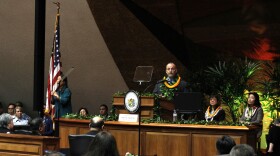Hawaiʻi lawmakers are moving along the controversial measure to ban non-medical exemptions for school-mandated vaccines.
The House Committee on Judiciary and Hawaiian Affairs narrowly voted in favor of House Bill 1118 on Friday. The 5-3 vote included two votes with reservations, but it’s now set up to cross over to the Senate.
Prior to the vote, testifiers who opposed the measure cited religious freedom under the U.S. Constitution, questions about effectiveness, and concerns and reports about side effects — all of which they said make the exemptions necessary.
Rep. David Tarnas, who chairs the committee, expressed concern about falling vaccination rates and the cost to public health.
“Decreasing immunization coverage due to rising rates of exemptions which have no medical basis does increase the risk for vaccine-preventable disease outbreaks that can be potentially fatal to children who attend school,” Tarnas said at the hearing.
“While immunizations reduce risk of severe illness for everyone, this trend is especially concerning for students with medical conditions who are unable to be immunized and who must rely on their vaccinated peers to prevent the introduction of vaccine-preventable diseases in their schools.”
Hawaiʻi students, except those with medical or religious exemptions, must have certain vaccinations as required by the state Department of Health.
But the department said about 39,600 students, or 21% of the state’s public, charter and private school students, were not up to date on the immunizations during the 2023-2024 school year. That number included students “claiming exemptions, those without immunization records, or students missing individually required vaccines” — a 25% increase in students with out-of-date vaccine records over the previous school year, the DOH said.

Falling vaccination rates, coupled with an increase in skepticism around vaccines, is a nationwide trend. And it’s already having impacts.
Measles was declared eradicated in the U.S. in 2000 following a vaccination campaign, but two ongoing outbreaks in Texas and New Mexico have infected about 100 people. About 90 of those who are infected are in West Texas — the state’s largest outbreak in 30 years.
The highly infectious, potentially deadly disease has spread mostly among a close-knit and unvaccinated Mennonite community, especially among families whose children are homeschooled or attend small, religious schools.
Vaccines have also had historical successes in reducing the spread of smallpox, malaria and polio.
Supporters of HB1118 include the DOH and medical professionals, who argue vaccines benefit not just those who get them, but those who cannot for medical reasons; herd immunity is when a highly vaccinated population protects those unvaccinated.
They also worry that many residents are being subjected to misinformation about vaccines.
Dr. Casandra Simonson, a Maui pediatrician who works with the Native Hawaiian community, said the consequences of a vaccine-preventable outbreak on a neighbor island would be especially damaging because of a lack of resources in rural areas.
“We're not even equipped for one measles case on my island, let alone hundreds,” she said. “ If you have an outbreak on a neighbor island, you will not be able to give good quality medical care to children, so the mortality rate will be much higher, and you can lose around 100 children with one outbreak.”
Vocal opposition to vaccines
Still, the idea of removing religious exemptions to vaccines in Hawaiʻi has led to one of the most hotly debated measures of this year’s legislative session. A majority of the public testimony submitted on HB1118 was against the measure.
“Piece by piece, our freedoms are being taken away from us as locals, as tax-paying citizens and as parents,” said Oʻahu resident Nicholas Kaneta.
Some reported medical “injuries” from vaccines, while others expressed distrust in the pharmaceutical industry, which also benefits financially. The companies that produced COVID-19 vaccines, which were mandated for some activities, led to billions of dollars in profits.
On Thursday, the Aloha Freedom Coalition held a rally at the state Capitol to oppose HB 1118. Sens. Brenton Awa and Samantha DeCorte and Rep. Diamond Garcia, all Republicans, spoke against the measure.
“Across the country in multiple states, including ours, there’s a movement that’s transpiring to eliminate and take away the rights, which are guaranteed not by government — these rights come from God,” Garcia said.
Garcia is also a member of the House Committee on Judiciary and Hawaiian Affairs, and, along with fellow Republican Rep. Garner Shimizu, voted against HB 1118 on Friday.
There was some bipartisan concern about the measure. Democrat Rep. Amy Perruso also voted against the measure, while Reps. Della Au Belatti and Mahina Poepoe voted with reservations. All three shared concerns that the DOH has not done enough public outreach to reduce vaccine hesitation.
“I’m hoping that this is not our idea of public outreach,” Perruso said. “I have one complex in my complex area where this is an issue, and I’m hoping that the Department of Health comes and has this conversation with community members, so that we can really make change and move people … in a way that people don’t feel like they’re responding to an oppressive act.”
Belatti said the state attorney general should have been at the meeting to answer questions about legal issues surrounding the proposal, and said, “I hope we get better conversation and dialogue” about the bill going forward.






